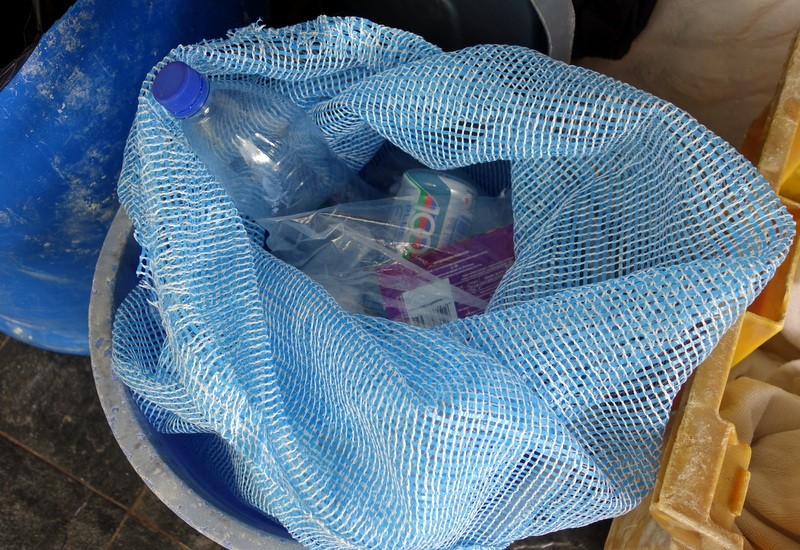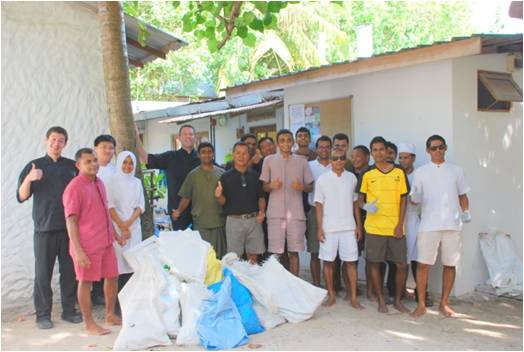We at Gili Lankanfushi realise that being sustainable starts with us.
August marks the commencement of our biannual sustainability training at Gili Lankanfushi. The first training, conducted in 2016, increased hosts’ knowledge and awareness about sustainability issues and this led to a marked decrease in water and electricity consumption in the host village. Naturally, over time, we have noticed a slight increase in electricity, water and litter, so to address this we decided to raise awareness within our team once again.
The training program aims to increase host knowledge regarding sustainability, with particular focus on plastic pollution and reducing food waste, water and electricity use. The training will achieve this by educating the hosts on exactly what plastic is, how much plastic pollution is in the ocean and what the effects of plastics are. There will be heavy emphasis on what hosts can do to protect our oceans and our health. The second part of the training will explore methods that will make the resort more sustainable. This will be achieved through slides explaining how electricity and water on the island is generated and by activities which will allow hosts to understand how much electricity and water is required for certain activities. Information will also be provided regarding food waste and the easy everyday changes that hosts can put into place to conserve resources. In addition to the above there will also be brief mention of black-naped tern conservation.
 |
| Example of one of the slides in the sustainability training – what hosts can do |
We are focusing primarily on plastic during the training as plastic in the oceans is a monumental problem. Currently we have a no plastic policy with guests. But plastic still arrives on the island via tide or from Malѐ. To address this, Gili Lankanfushi is currently in the process of launching a plastic recycling project with Parley an international NGO. Parley’s project is the first of its kind in the Maldives and we are training our hosts so that they can recycle their plastic and get involved too. We will collect clean plastic like water bottles; these will be put into recycled plastic bags, when full they will be emptied into a main jumbo bag which is sent to Malѐ. Parley collects this bag and recycles it. We currently have these plastic collection bags in the dive centre, with the gardeners and in the management accommodation. During training we will roll this out in the host area.
 |
| Plastic recycling in the dive centre |
Plastics are polymers containing hydrocarbons. These polymers are made from natural gas, oil, coal, minerals or plants. In addition to natural plastics (rubber from rubber trees is an example of plastics produced by nature) there are synthetic plastics – polyethylene, polystyrene and polypropylene. The first synthetic plastics were derived from cellulose heated with chemicals. In 1600BC, Mesoamericans used natural rubber for balls, bands, and figurines. In the 1800s plastic development boomed in order to protect scarce resources, for example turtle shell and ivory which was used to make billiard balls. Plastics are desirable materials due to their flexible properties which can be altered by chemists to suit the needs of the product. The plastics that we produce today can take up to 1000 years to degrade which is why our oceans are running into serious problems.
 |
| One of the activities is for hosts to guess how long it takes for certain materials to degrade |
Currently, it is estimated that there are 5.25 trillion pieces of floating plastic debris in our oceans and it has been predicted that if we stay on this current path there will be more plastic than fish in the ocean by 2050. A study in the North Pacific Central Gyre in 2001 found that the mass of plastic was approximately six times that of plankton. Plastic affects every living organism, from micro plastics being ingested by fish ultimately ending up on our plates, to oceanic dead zones, to marine life entanglement and to surfers, swimmers and divers involuntarily swallowing plastics. In addition, plastic can kill marine life in a variety of ways, for example by causing starvation as their stomachs are so full of plastic they can’t eat, or by entanglement and entrapment from plastic structures. We are also affected by plastics; plastic exposure can lead to reproductive problems, hormonal changes, birth defects, diarrhea, Parkinson’s disease, brain and nervous system damages, rashes and the list goes on. This is why training our hosts about plastic waste is so critical for the ocean to survive and also for the health of all life on earth.
Host training will highlight the negative impacts of plastic pollution; more importantly the training will focus on what hosts can do to further reduce plastic pollution on Gili Lankanfushi. Hosts will leave the training knowing everyday changes they can make to help the environment and themselves. Examples include: using cloth bags and diapers, changing what they buy so reusable items are selected over single use items, such as disposal razors, water bottles and straws. In addition to educating their friends and family about the impacts of plastic pollution, hosts can also get involved in reef and beach cleans.
 |
| Hosts getting involved in host village clean up |
Although our battle with plastic is just beginning, we will assist Parley with the rolling out of the plastic recycling project on the local island of Himmafushi. We are constantly working to become more sustainable and training our hosts is such an important part of our progress.
Please read our next blog for updates on how the training went and information on electricity, water and food waste!